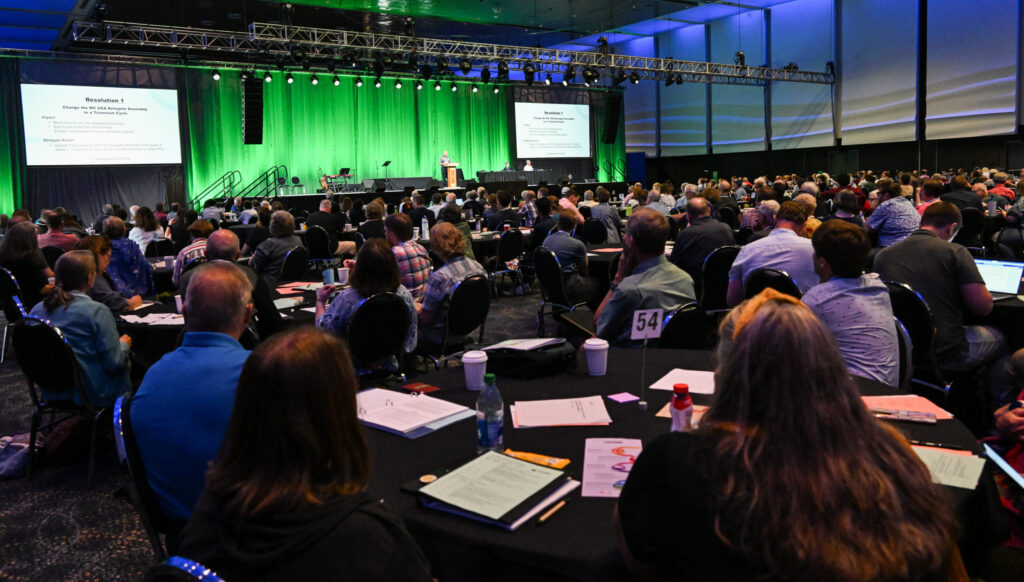
Delegate Assembly 2023. Photo by Ken Krehbiel for MC USA.
The Mennonite Church USA Delegate Assembly acted on three proposed organizational resolutions at its meeting on July 7-8, 2023, in Kansas City, Missouri. The assembly of more than 300 registered delegates approved resolutions to clarify the MC USA bylaws and streamline its agency structure, while narrowly voting down a proposal to meet less frequently.
Resolution 1: Change the MC USA Delegate Assembly to a triennium cycle
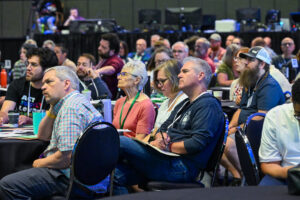
Delegate Assembly 2023. Photo by Ken Krehbiel for MC USA.
The vote on the Executive Board’s recommendation to switch from a two-year to a three-year meeting cycle failed to achieve the required two-thirds majority, even though it was supported by 65.6% of delegates (210 yes votes, 110 no, 3 abstentions).
Delegate concerns around the proposed switch focused on the desire to gather youth more frequently for convention. Although MC USA’s MennoCon convention and Delegate Assembly have traditionally been held during the same week, the bylaws only address the frequency of Delegate Assembly meetings.
Kate Bodiker, a youth from Berlin (Ohio) Mennonite Church, said, “Even though I recognize the business aspects of this, I think that in our current time and knowing the relationship that people my age have with the church and with connecting, getting people together is one of the best ways we have for keeping people engaged.”
Newly affirmed Moderator Jon Carlson reflected on the vote, which the Executive Board positioned as necessary for adequate discernment processing and execution of delegate assembly actions. He admitted that he was unhappy at first and then realized that “…what we yearn for is togetherness, closeness, a sense of fellowship, even family with one another … This is something we can build on and grow together. It is remarkable that, in this church with our recent history, we still have this desire to be the family of God together.”
Resolution 2: Change to clarify the role of the program entity
The second resolution to revise the bylaws to clarify the role of program entities was adopted with strong support (310 yes votes, 4 no, 2 abstentions). This resolution allows the Executive Board to simplify the language related to the governance relationship with program entities/ministry partners that’s described in Article 10 of the MC USA bylaws.
“Anything that clarifies the role of the entities or the agencies is helpful,” said Craig Maven, delegate for Virginia Mennonite Conference, to a chorus of laughter and a round of applause. Maven’s comment seemed to capture the sentiment in the room, as there was no further discussion prior to the Delegate Assembly action.
Resolution 3: Change in Agency Status
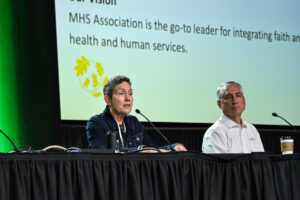
Karen Lehman, president and CEO of MHS Association, and Ken Hochstetler, president and CEO of Everence, address questions at the 2023 Delegate Assembly. Photo by Ken Krehbiel for MC USA.
The Executive Board also requested the counsel and advice of the Delegate Assembly for a mutually supported proposal to shift Everence and MHS Association from program agencies to program entities/ministry partners. Delegates listened to presentations from the two agencies and were given time to discuss, share and discern before providing their feedback using an online survey. Of the 237 delegates who responded to the survey, 90% were supportive of the resolution. Of the 90%, 141 said the proposal had their “whole-hearted endorsement,” 50 said they agreed “with minor point of contention,” and 24 said that they supported it “with reservations.”
The Executive Board proposed the resolution to clarify and reduce operational and governance complexity.
Delegate concerns regarding the shift centered around board appointments, loss of connection to congregations and potentially less alignment with MC USA priorities.
“MHS Association came out of the church and has been connected with our Anabaptist faith and values since its very beginning,” said Karen Lehman, president and CEO of MHS Association. “This will not change. What gives us purpose is our faith connectedness. Without our Anabaptist faith and values, we would not be an association that any of our member ministries would really need or want to be part of.”
Ken Hochstetler, president and CEO of Everence, affirmed that Anabaptism is deep in the Everence DNA and that the organization is committed to serving people at the intersection of faith and finance. “We fully intend to relate to conferences as a ministry partner of MC USA in ways that will be both familiar and new,” he said. “Working together helps to build healthy financial stewardship cultures, which in turn helps congregations experience greater spiritual vitality, resources pastors for improved capacity for ministry, and [helps] individuals and families practice stewardship as an Anabaptist spiritual discipline.”
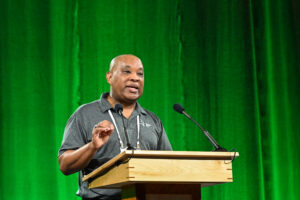
MC USA Executive Director Glen Guyton addresses questions at the 2023 Delegate Assembly. Photo by Ken Krehbiel for MC USA.
In response to the survey feedback, Guyton assured delegates that The Corinthian Plan, the Pastor Salary Guidelines and Mennonite Retirement Trust will continue as before, as they are under the authority of the Executive Board. Everence serves as a third-party administrator for these programs.
Based on the positive feedback, delegates voted (305 yes votes, 4 no, 3 abstentions) to empower the MC USA Executive Board to make the necessary revisions to the bylaws to reflect the new entity partnership/ministry partner status of these organizations, pending Executive Board action.
Leaders of the Executive Board, Everence and MHS Association will work together to develop an intentional communications plan and a Memo of Understanding to formalize the new relationship.
The next MC USA Executive Board meeting is Oct. 18-20, 2023, in Cleveland, Ohio.
Worship and Storytelling
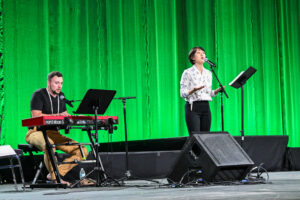
Lane Miller and Sae Jin leading songs at Delegate Assembly 2023. Photo by Ken Krehbiel for MC USA.
The business of the Delegate Assembly was generously wrapped in worship and storytelling, centering on the denomination’s 2021-2023 theme of transformation.
Rev. Sarah Ann Bixler, PhD, assistant professor of Formation and Practical Theology and associate dean of Eastern Mennonite Seminary in Harrisonburg, Virginia, presented three Bible study sessions, titled, “Scenes from the Upper Room: Expectations and Transformations.” Sae Jin and Lane Miller of Chicago, Illinois, served as song leaders.
Two MC USA Justice Fund grant recipients shared stories about how they are working in their respective communities. The Justice Fund supports MC USA congregations that are seeking to combat poverty, dismantle racism, address immigration reform or reimagine policing.
Susan Hart, MC USA Executive Board member, pastor of Koinonia Indian Mennonite Church in Clinton, Oklahoma, and a member of the Cheyenne and Arapaho Tribes of Oklahoma, spoke about her work with Project S.A.C.R.E.D., which stands for Solidarity, Acknowledgement, Collaboration, Recognition, Education and Dignity.
The project is an effort to address the physical, mental and spiritual issues faced by the families of students from the Cheyenne and Arapaho Tribes who attended Mennonite-run residential schools. At this early stage, work has centered on what Hart describes as a “monumental effort” to identify the students and bring closure to the families and people of the tribes.
“I know that, as Mennonites, we can come together and address this issue because we have to be at the front of this process,” said Hart.
Ivanna Johnson-McMurry from Boulder (Colorado) Mennonite Church shared about her congregation’s work with Hallet Academy, an under-resourced public elementary school in Denver, Colorado. The students are predominantly Black and the vast majority live below the poverty line/are unhoused. Boulder Mennonite Church works directly with the school to provide school supplies and clothing for the children.
Johnson-McMurry said that this is what the Bible speaks of in Micah 6:8 when it says that God desires us to do justice, love mercy and walk humbly with our God.
“Financial support and contributions to BIPOC-led organizations are what true reparations look like,” Johnson-McMurry said. “It’s what social justice looks like. It’s what mercy looks like. It’s what love and healing and restoration look like.”
MC USA’s five agencies also showcased their work through videos and presentations that demonstrated how it has been transformative for the constituency and their communities.
Mennonite Church USA is the largest Mennonite denomination in the United States with 16 conferences, more than 500 congregations and approximately 50,000 members. An Anabaptist Christian denomination, MC USA is part of Mennonite World Conference, a global faith family that includes churches in 59 countries. It has offices in Elkhart, Indiana, and Newton, Kansas. mennoniteUSA.org
Written by Camille Dager, MC USA staff.
See additional photos from MennoCon23, the Youth and Young Adult Climate Summit and the Delegate Assembly here.

